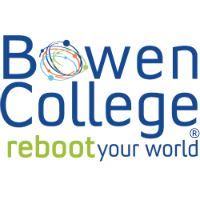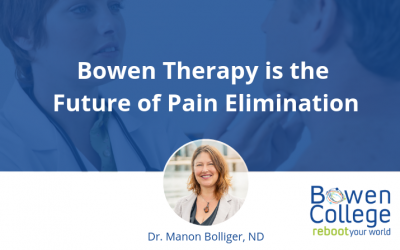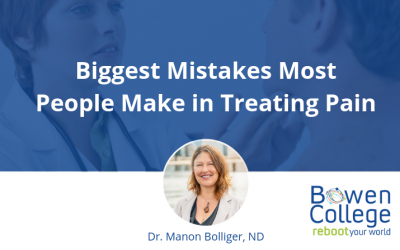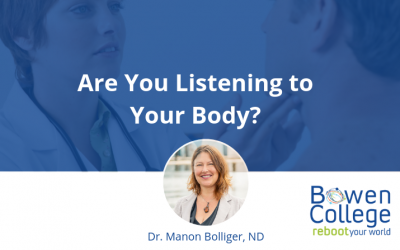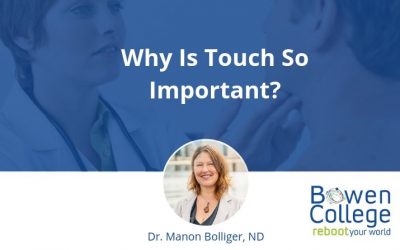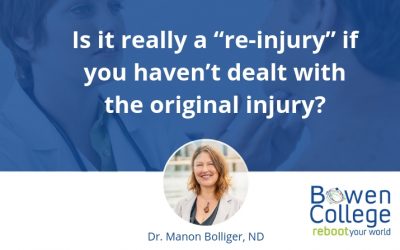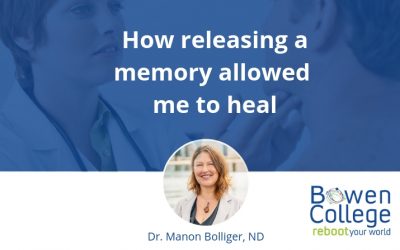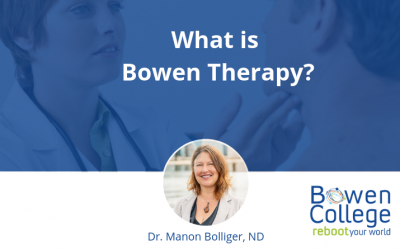News from the Bowen College community
Bowen College is committed to patient-centered, pain-free care. Read news from our community.

Subscribe to the Bowen College blog to read the latest updates for holistic, patient-centered care
Does Healing Demand Hard Work?
Healing demands hard work. We all know just how physically demanding certain body therapies can be. Healthcare practitioners work long hours putting constant strain on their joints and muscles. Many body therapists overextend themselves depleting their energy and...
Do you have Health-Promoting Boundaries with your Clients?
Do you have health-promoting boundaries with your clients? Do you suffer from a limited understanding of your role as a therapist? Unhealthy boundaries where we are taxing our own bodies may actually stem from a genuine desire to heal our clients despite knowing that...
Do You Believe that Sacrificing Yourself is of Service to your Clients?
Taking the wellbeing of our clients as our own is far more common than you think. Actually, it stems from the belief that we can fix everything. That your patient’s story and their pain is literally yours, to the point where you have neglected or disconnected from...
Bowen College UK: Making Strides in the News
Three Elements You Can Apply to Your Practice Right Away
Today I have three elements that you can apply to your practice right away. #1. Less is more. #2. Trust that the body can heal. #3. Learn to be as relaxed as your clients while serving them more fully. If you are already a healthcare practitioner, check our...
What’s Your Back Pain About?
I recently treated a patient who was suffering from back pain. She had seen a chiropractor and tried other therapies before someone told her that I could help her. I asked her, “What’s your back pain about?” To which she responded, “Well, no one has asked me that.”...
Why is Interoception so Significant?
The nervous system extends a vast network of nerves that runs through the fascia, becoming part of the fascia itself. The result is a fluid nervous system with neuropeptides and neurotransmitters that communicate chemical, emotional and biological information from one...
Bowen Therapy is the Future of Pain Elimination
I was inspired to create Bowen College when I realized that it was not only an effective program but that it could also reach so many people. I wanted to create a pain elimination program that would really support the practitioners by helping them hone in on all of...
Biggest Mistakes Most People Make in Treating Pain
Today’s post is a national television interview with Dr. Manon about the biggest mistakes that most people make in treating pain. Host: Well, it's estimated that one in four Americans have suffered from pain that lasts longer than 24 hours. So what's the best way to...
Pain Hurts More than you Might Know
In a previous post, I discussed one of the consequences of the war on symptoms: the over-reliance on cortisone shots, which create a false sense of security often leading to a “re-injury” of the original problem. Though really it’s more of an aggravation of the...
Are You Listening to Your Body?
Have you or anyone you know had an unwelcome diagnosis, could be tennis elbow, diabetes, arthritis? I have developed a system to help you take the story out of the diagnosis and reframe your health, starting by listening to your body. What I have come to know for...
Why Is Touch So Important?
At the British Fascia Symposium, I had the pleasure of listening to many talented professionals, researchers and scientists. In particular, I wanted to share the insights of Carol M. Davis and Robert Schleip, as well as incorporate my own experience as a clinician and...
Is it really a “re-injury” if you haven’t dealt with the original injury?
The recent few posts here told a personal story about how I discovered firsthand the importance of not treating an injury and its pain as mere symptoms, but allowing a deeper personal, subjective experience to emerge. This is the key lesson I have been trying to...
How releasing a memory allowed me to heal
The last couple posts have been telling the story of my experience as a patient and how I learned firsthand that pain is more than just its symptoms. After getting a variety of conflicting advice, I finally made myself the doctor of my own treatment and came to...
How Therapists Benefit From Bowen College
Massage therapist, Christopher Sherman reviews Dr. Manon Bolliger's LISTEN program - a part of Bowen Therapy certification program at Bowen College. Sherman has taken Dr’s Bolliger’s LISTEN program. The LISTEN program is an exploration of all the components at our...
Taking the Measure of Contradictory Advice
In the last post I introduced you to a personal experience I had of subluxation of my right shoulder during a holiday in Paris. A trip to the hospital got me a sling and some drugs that either didn’t work or made me feel ill. What was to be done? The pain grew...
What is Bowen Therapy
The BowenFirst™Technique is a body manipulation therapy that uses very gentle pressure to stimulate the brain to reboot the body. Oftentimes, the most common approaches to stress management just don’t work and when they do, they don’t have long lasting results for the...
My Trip to the Hospital
In my last post I made some claims about pain that I want to illustrate with a personal example. This will take us a couple posts to cover, but it’s time well invested. During a holiday in October 2011, I had a subluxation of the right shoulder upon arriving in Paris....
The Bowen Technique Heals Pain and Trauma
As diverse as we are, emotional and physical pain is something most of us have in common. Pain relief is another story. Conventional medicine tends to fall short palliating with pills rather than curing, but there is an alternative. Award-winning naturopath Dr. Manon...
Pain Relief: Another Casualty in the War on Symptoms
We’ve been discussing the impact of the “war on symptoms” approach to health care. Let’s look at another example: pain following an injury. Our perception of the role and function of pain will determine how we experience the pain and what we want to do about it. The...
Why I Started Bowen College
I am Dr. Manon Bolliger, ND and I started Bowen College because I felt it was important to share an approach to healing that could help engage patients and clients in their own health. Once you address people’s pain they are then ready to address all of their health...
The Persecution of Dr. Stanislaw Burzynske
I finished my last post with the provocative claim that non-war on symptoms healthcare approaches were not only unfunded and sabotaged, but actually outlawed. If you suspect I’ve exaggerating, consider the case of Dr. Stanislaw Burzynski over the last 30 years. His...
The War on Cancer as Part of the War on Symptoms
In my last post I reflected on the short-sighted predilection to remove the gallbladder of patients with chronic gall stone problems. As I pointed, though, this was not the end, but the beginning of a treadmill of new problems. Certainly those symptoms too can be...
Failing Cancer Patients
In recent posts I’ve been discussing fallout from the misguided war on symptoms approach to health care and – in the last post – specific problems related to cancer treatment were raised. Let’s look more closely at this situation. Despite all the effort and resources...
